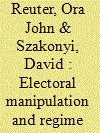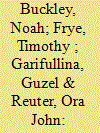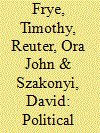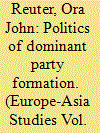| Srl | Item |
| 1 |
ID:
178722


|
|
|
|
|
| Summary/Abstract |
Does electoral fraud stabilize authoritarian rule or undermine it? The answer to this question rests in part on how voters evaluate regime candidates who engage in fraud. Using a survey experiment conducted after the 2016 elections in Russia, the authors find that voters withdraw their support from ruling party candidates who commit electoral fraud. This effect is especially large among strong supporters of the regime. Core regime supporters are more likely to have ex ante beliefs that elections are free and fair. Revealing that fraud has occurred significantly reduces their propensity to support the regime. The authors’ findings illustrate that fraud is costly for autocrats not just because it may ignite protest, but also because it can undermine the regime’s core base of electoral support. Because many of its strongest supporters expect free and fair elections, the regime has strong incentives to conceal or otherwise limit its use of electoral fraud.
|
|
|
|
|
|
|
|
|
|
|
|
|
|
|
|
| 2 |
ID:
134713


|
|
|
|
|
| Summary/Abstract |
Political and economic outcomes depend, in part, on the quality of the officials making policy. Some argue that free elections are the best method for selecting competent officials. Others argue that elections lead to the selection of amateurs and demagogues. We use original data on the biographies of Russian regional governors to examine the backgrounds of elected and appointed governors. Elected governors are more likely to be locals. Appointed governors are more likely to be federal bureaucrats or hold a graduate degree. We conclude the paper by speculating on other possible explanations for variation in governor background.
|
|
|
|
|
|
|
|
|
|
|
|
|
|
|
|
| 3 |
ID:
129981


|
|
|
|
|
| Publication |
2014.
|
| Summary/Abstract |
The authors explore how modern autocrats win elections by inducing employers to mobilize their employees to vote for the regime and thereby subvert the electoral process. using two original surveys of employers and workers conducted around the 2011 parliamentary elections in russia, they find that just under one-quarter of employers engaged in some form of political mobilization. they then develop a simple framework for identifying which firms engage in voter mobilization and which workers are targeted for mobilization. firms that are vulnerable to state pressure-financially dependent firms and those in sectors characterized by asset immobility-are among the most common sites of workplace-based electoral subversion. the authors also find that workers who are especially dependent on their employer are more likely to be targeted for mobilization. By identifying the conditions under which workplace mobilization occurs in authoritarian regimes, the authors contribute to the long-standing debate about the economic bases of democratization. in addition, they explore an understudied means of subverting elections in contemporary autocracies: the use of economic coercion to mobilize voters. Moreover, their research finds that clientelist exchange can thrive in industrial settings and in the absence of deeply embedded political parties.
|
|
|
|
|
|
|
|
|
|
|
|
|
|
|
|
| 4 |
ID:
093722


|
|
|
|
|
| Publication |
2010.
|
| Summary/Abstract |
This article analyses the emergence of United Russia (Edinaya Rossiya) as a dominant party by examining the behaviour of Russia's governors. Using original data on when governors joined United Russia, the article demonstrates that those governors with access to autonomous political resources were more reluctant to join the dominant party. By showing that Russian elite members made their affiliation decisions on the basis of calculations about their own political resources rather than simply being coerced by the Kremlin, this article provides evidence for a theory of dominant party formation that casts the problem as a two-sided commitment problem between leaders and elites.
|
|
|
|
|
|
|
|
|
|
|
|
|
|
|
|